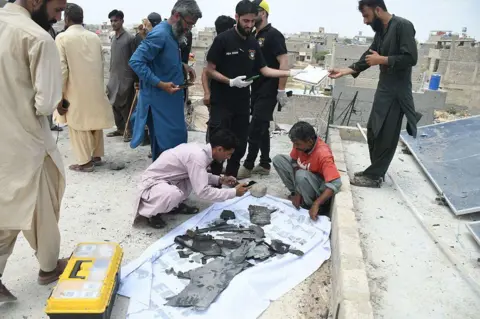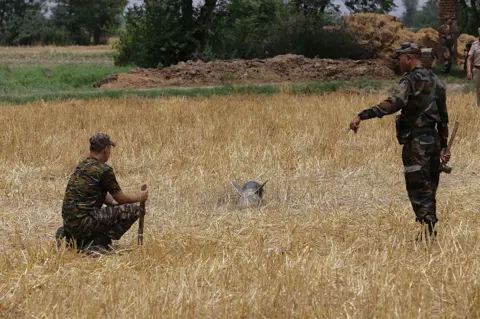The world's first drone war between nuclear-armed neighbours has erupted in South Asia.
On Thursday, India accused Pakistan of launching waves of drones and missiles at three military bases in Indian territory and Indian-administered Kashmir - an allegation Islamabad swiftly denied.
The Latest :
The escalating tensions between India and Pakistan have reached a critical point, with both nations engaging in military exchanges along the border. The situation has intensified following India's Operation Sin door, a series of precision strikes targeting terror infrastructure in Pakistan and Pakistan-occupied Kashmir. In response, Pakistan launched drone and missile attacks on Indian military installations, which were intercepted by India's advanced air defence systems.

Remnants of an Indian drone strike being inspected in Karachi on Thursday
Recent Developments:
Cross-Border Artillery Fire: Indian and Pakistani troops exchanged heavy shelling overnight, resulting in civilian casualties on both sides
Drone and Missile Attacks: Pakistan attempted to infiltrate Indian airspace with drones, which were swiftly neutralized by India's defense systems.
Several regions in India, including Jammu and Rajasthan, experienced power outages as air raid sirens warned residents to stay indoors.
Pakistan's Defence Minister Khawaja Asif declared that the country has "no option other than full-blown war" with India.
The global community is urging de-escalation, but key players like the U.S. have taken a cautious stance, with President Trump stating that the conflict is "none of our business".
What’s Next
With both nations on high alert, the possibility of further escalation remains a serious concern. Diplomatic efforts to de-escalate the situation are crucial, but nationalist rhetoric and military actions continue to fuel tensions. The world watches closely as India and Pakistan navigate this volatile crisis.
 Getty Images
Getty ImagesWhile drones have fundamentally reshaped the battlefield in Ukraine, their role in the India-Pakistan conflict remains more limited and symbolic, say experts. Both countries are using their manned air forces to fire missiles at one another as well.
"The drone warfare we're witnessing may not last long; it could be just the beginning of a larger conflict," says Mr Joshi.
"This could either signal a de-escalation or an escalation - both possibilities are on the table. We're at an inflection point; the direction we take from here is uncertain."
Clearly India is integrating drones into its precision-strike doctrine, enabling stand-off targeting without crossing borders with manned aircraft. However, this evolution also raises critical questions.
"Drones lower the political and operational threshold for action, providing options to surveil and strike while trying to reduce escalation risks," says Prof Matisek.
"But they also create new escalation dynamics: every drone shot down, every radar blinded, becomes a potential flashpoint in this tense environment between two nuclear powers."
Stay tuned for more updates as the situation unfolds. What are your thoughts on this conflict?









